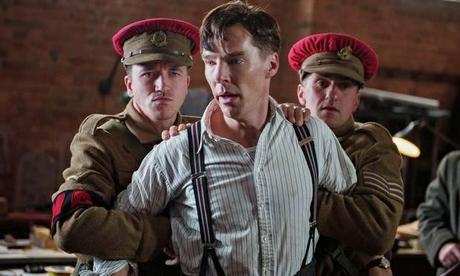 It's Christmastime, so let's watch some ostentatious Oscar bait. Morten Tyldum's The Imitation Game (2014) provides a competent biopic of Alan Turing, legendary mathematician, computer scientist and WWII cryptographer. Benedict Cumberbatch gives an excellent performance, but the movie holds few surprises.
It's Christmastime, so let's watch some ostentatious Oscar bait. Morten Tyldum's The Imitation Game (2014) provides a competent biopic of Alan Turing, legendary mathematician, computer scientist and WWII cryptographer. Benedict Cumberbatch gives an excellent performance, but the movie holds few surprises. During World War II, Britain's Government Code and Cypher School recruits mathematician Alan Turing (Benedict Cumberbatch) to crack Germany's Enigma code. Turing's arrogance and social awkwardness grate on his colleagues, yet he hits on an ingenious solutions. Rather than spend days fruitlessly deciphering code, Turing creates a primitive computer that cycles through millions of combinations a day. Turing befriends Joan Clarke (Keira Knightley) and earns the confidence of an MI6 spymaster (Mark Strong), slowly warming to his colleagues. Yet Turing harbors a secret: his homosexuality.
Though the Enigma story's been told before (Breaking the Code, Enigma), The Imitation Game resembles Powell and Pressburger's The Small Back Room: the isolated hero, secretive research and block-headed bureaucrats threatening the war effort. Writer Graham Moore mines these familiar conflicts alongside shaky inventions. There's a painfully contrived scene where Turing faces an agonizing choice of saving a naval convoy or avoiding exposure. Game does better with real-life scenarios: the cryptographers scrapping their entire day's work at midnight, or Turing discovering Enigma's key from a barroom flirtation.
Game paints Turing as an awkward, possibly autistic outcast. He takes metaphors literally, obsessively separates peas from carrots, relates better to machines than people. Moore shows Turing battling his own inhibitions, trying to win over colleagues with his apples and faked bonhomie. His attachment to Joan becomes genuinely touching: they connect on a deep emotional level, even if it remains chaste. Turing's peculiar genius makes him invaluable, but ultimately destroys him.
In recent years, Turing's homosexuality has been spotlighted. In 1952 he was convicted of gross indecency, chemically castrated and ultimately committed suicide. Queen Elizabeth pardoned him in 2013. Game folds this into their overall portrait of Turing as outcast. Historians have objected to Game having a Soviet spy blackmail Turing: this invention's more superfluous than offensive. Less effective is a superfluous time shift between Turing's boarding school childhood, war activities and postwar arrest, which muddies rather than clarifies.
Benedict Cumberbatch plays Turing with his characteristic charm. His weirdness is more charming than off-putting, earning the audience's sympathy and respect. Keira Knightley's pinched line readings and incessant teeth-clenching have become more bland than irritating. Charles Dance and Mark Strong give dependable supporting turns, though Rory Kinnear, Matthew Goode and Allen Leech struggle with underwritten characters.
The Imitation Game can be forgiven for simplifying Turing's life and achievements: certainly he can claim historical significance more than most period piece protagonists. Ultimately though, it's typical year-end award bait: great acting, weighty subject matter, familiar story beats.

